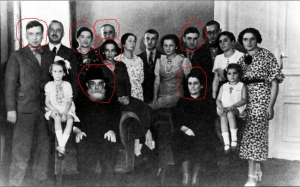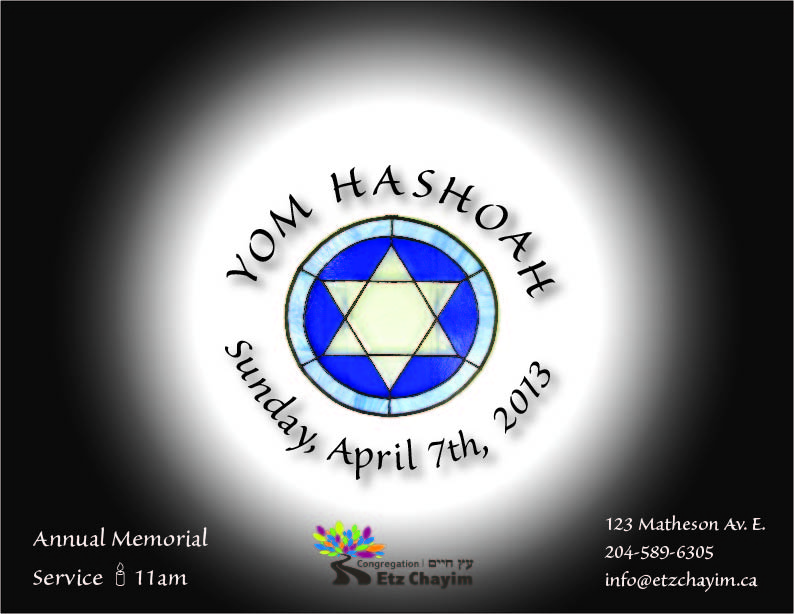Tomorrow is Holocaust Memorial Day in Israel, Yom hashoa. The date, the 27 of the Jewish month of Nisan, was chosen as a connecting point between two other highly significant days, the uprising in the Warsaw Ghetto and Israels Independence Day. On two significant days in the spring, the sirens go off and the country halts for a minute, on Holocaust Memorial Day and on Memorial Day. To the piercing wail of the sirens, we stand at attention and listen to the pain that has given birth to the state of Israel. And I’m talking about the pain of the Jews.
Tonight, my mother will speak about her memories from the war in Warsaw Ghetto and later, in hiding. When we were kids, my mother never spoke publicly about her childhood. There were others who had it worse, and also, she was a child at the time. Now she feels that she needs to be the one to carry the burden of being a witness, because each year there are fewer and fewer people around who were there.
My mother’s experiences are her personal trauma, but also our colletive trauma as Jews. When the war broke out, on September 1, 1939, my mother was seven years old. She was looking forward to celebrating her eigth birthday on September 10 with a small party, the way she had done in previous years. Because she is Jewish, she did not celebrate that year, or any birthday for the next six years. It’s not so terrible not to celebrate birthdays, there are many millions of people who don’t. It’s the randomness of what happened that is difficult to understand. One day you have a life, and certain rights, and the next day you don’t. Or rather, gradually, you don’t. It took a year of German occupation of Warsaw until the Jews were moved to the Ghetto. During that year they were stripped of their rights to move freely, to work, to own property and to mix with the rest of society. It took two more years of confinement and forced labour till the Ghetto was liquidated, at which point it had become forbidden for Jews, and other undesirables, to live. From celebrating birthdays, to not being legally entitled to be alive, in six years.
Because my mother is Jewish, she and her family had to leave their belongings to strangers who came to their house and told them that their things were no longer theirs. She had to leave school, to move in with her grandparents, whos’ apartment happened to be located in what became the Jewish ghetto, with 13 other members of the family. The Jews of Warsaw were confined to the area of the ghetto, at the mercy of their German and Polish captors. 400,000 Jews, a third of Warsaws popultion, were crammed in to 3.4 km2. Over the course of two years, until the ghetto was liquidated, 75% of these people died of illnesses, random executions, starvation, and for those who survived the ghetto, deportation to Treblinka and other camps. A few lucky ones, like my mother and her closest family, managed to escape the ghetto before the end, and survived by the skin of their teeth.
We, in Israel and amongst Jews worldwide, remember the Holocaust, on a personal and national level in many different ways. My son, who is in 12th grade, recently came back from a week in Poland with his class. Many schools in Israel participate in such excursions. My oldest daughter went some years ago with her class, which included two Druze students. During the trip, the kids travel across Poland and learn about 1000 years of Jewish history and culture, and how it came to an end. There is a lot of emphasis on the geography and history of the Holocaust, but increasingly, there is an attempt to learn about Jewish life, and not only Jewish death. My youngest, a sixth-grader, will participate in a commemorative ceremony in school tomorrow and she will light a candle in honour of her grandmother’s family.

Hava and David Pizyc, my paternal great-grandparents with their children and some of the grand-children. Those circled in red did not survive the Holocaust.
So what is the point of all this remembering? Well, to begin with, it’s kind of hard to forget. For me, and other children of survivors, it’s personal. This is what happened to my mother, my family. This is the reality she lives with, and therefore, it is the reality I grew up in. But for the rest of the Jews, it’s also personal. 70 years ago, being born Jewish in Europe was a crime punishable by death. A slow and cruel death. Being Jewish was no more their fault or choice than it is mine. Had I been there….. well the logic is simple. There are those who say it never happened, or that it was a small hick-up in the grander scheme of things. If you are not afraid of the dark, Google “Holocaust” and you’ll see that surprisingly many of them know how to set up a home-page. There are those who say that we maintain or expand the memory of the Holocaust for personal or national gain. To which I say, there is really no need to exaggerate what happened and we have rightfully gained our right to at least remember.
The Holocaust is not like anything else in known history. It is the ice-age of the heart, where much of a continent chose to lift itself up from the mud by treading on some of its inhabitants. Not because those groups, Jews, Roma and others, deserved it in any way, but because they were defenceless.
I admitt that I’m not receptive to those, mostly Europeans, who like to draw parallels between the Holocaust and the situation in the Middle East, or any other situation. There are no parallels, and I hope to god there will never be another situation that calls for comparison. To those who feel the Holocaust is an opportunity to preach to the Jews about morality, I say, shame on you. Tonight I will listen to my mother tell her story. If nothing else, it comforts her to share a tiny bit if her burden. She shouldn’t have to defend herself against those who now want to take away her past. But she, and we, do. I’m sure it would be easier for my mother to stay at home. So I salute her for helping us remember the truth.
Noomi Stahl

